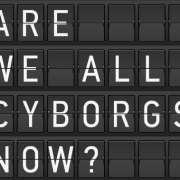For quite a while now, the technological oligarchs have been holding out the virtual realm as a world of limitless possibility, the path to individual and corporate flourishing. The virtuality-as-liberation narrative tells us that everything time and space can do, the digital ecosystem can do better. But in the wake of last year’s lockdowns, I think a lot of us discovered that what the internet does best, namely to connect us, it also does worst. Stuck at home and glued to our computers and smartphones, we found that we were not more connected than ever before, but less. Not only did virtuality fail in its promise of emancipation, but it simply underscored our remoteness from one another.
Who should now be recognizing this but Mark Zuckerberg of all people. In his recent announcement at Facebook’s annual AR/VR conference, he shared how disconnected everyone feels after meeting over Zoom and the mobile internet. But he has a fix: we need to create a better type of internet. Specifically, we need the metaverse. Watch the first couple minutes of the video below.
What really stood out to me from this video were these words:
“The next platform and medium will be even more immersive: an embodied internet where you’re in the experience, not just looking at it. And we call this the metaverse. And you’re going to be able to do almost anything you imagine…. We’ll be able to feel present like we’re right there with people no matter how apart we actually are. We’ll be able to express ourselves in new, joyful, completely immersive ways, and that’s going to unlock a lot of amazing new experiences… Instead of looking at a screen, you’re going to be in these experiences.”
Wow, an internet (digital Tower of Babel?) that you can enter into. An internet that will simulate the types of connections we have in the real world. I’m feeling warm fuzzies just thinking about it.
What we are seeing unfold before our eyes is, in fact, the type of situation discussed at last year’s Think Big Festival in Coeur d’Alene Idaho, which I reported on in my Salvo column. At this conference engineers told me and the other attendees about the type of future they were trying to create for us, one where we would all become “cyborgs.” (The language is not mine but theirs.)
Meta Man (aka Mark Zuckerberg) takes a different approach, eschewing talk about things like “cyborgs,” and other technocratic lingo. Instead, he adopts the language of human connection.
It’s a hard road ahead for Meta Man: not only does he have to create the metaverse, but he somehow has to package existential solipsism as the ultimate form of human connection. This might seem like an impossible task, but not if humans first become “optimized.” To live in the type of world these engineers are trying to create requires that we become the type of people who can passively receive such a world, that we become people who have surrendered our inner sensitivity to the natural rhythm of things, that we become the types of men and women who see technological absolutism as a positive good, and that we embrace a narcissism that looks upon the world as simply one more deliverable to satisfy our desires. It requires that we become impatient with reality, and thus for us to turn into the types of people who will greet a digitally optimized world as a form of redemption.
It is easy to think, “It would never happen to me, because I would never become that sort of a person.” But in fact, the optimization of humans for metaverse-compatibility is already well advanced. Consider how many parents are ostensibly spending time with their children while actually living elsewhere, distracted by what is happening on their phones. Consider how many spouses spend more time with technology than with each other. The turn away from physical reality to the digital ecosystem is now so commonplace that it seems normal. The final step, namely that we would rather spend our days living inside the “metaverse,” may turn out to be a very small step from where we are already.
Further Reading
- Zuckerberg Goes Meta
- The Metaverse: Heaven for Soy Boys, Hell on Earth for Us
- We’re All Cyborgs Now…Almost
- From Augmented Reality to Metaverse


